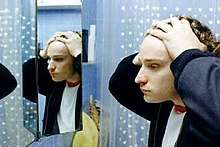Rapado
Rapado is an Argentine and Dutch 1992 film, written and directed by Martín Rejtman, his first feature film.[1]
| Rapado | |
|---|---|
 Screenshot | |
| Directed by | Martín Rejtman |
| Produced by | Martín Rejtman |
| Written by | Martín Rejtman |
| Starring | Ezequiel Cavia Damián Dreyzik |
| Music by | Grupo Suárez Paul M. van Brugge |
| Cinematography | José Luis García |
| Edited by | Garry Lane |
Release date |
|
Running time | 75 minutes |
| Country | Argentina Netherlands |
| Language | Spanish |
Plot
The film tells the story of a teenager whose motorcycle, money and sneakers are stolen. He wants to steal another motorcycle before the end of the night.
Cast
- Ezequiel Cavia
- Damián Dreyzik
- Mirta Busnelli
- Horacio Peña
- Lucas Marty
- Cecilia Biagini
- José Glusman
- Pichón Baldinú
- Verónica Llinás
Background
The director/producer Martín Rejtman used a minimalist style in making this film. He said, "When I made Rapado, I felt that Argentinean cinema had too much dialogue, and bad dialogue at that. I hate adornments, I hate artifice, I hate anything that's unnecessary, because there really is nothing beyond the screen."[2]
Exhibition
The film was first presented at the Locarno International Film Festival in Switzerland in August 1992. It was released wide in Argentina on August 1, 1996.
Critical reception
Pablo Suárez, a film critic for the Buenos Aires Herald and a member of FIPRESCI Argentina said, "[Rapado, his] first feature demonstrated that another type of cinema was possible in Argentina, one capable of pushing boundaries. Rapado was an absolute oasis in a land plagued by films with agonizing narratives, with neither depth nor genuine inspiration, and yet still subsidized by a State in favor of the status quo."[3]
Awards
Wins
- Argentine Film Critics Association Awards: Silver Condor; Best First Film, Martín Rejtman; 1997.
Nominations
- Locarno International Film Festival: Golden Leopard; Martín Rejtman; 1992.